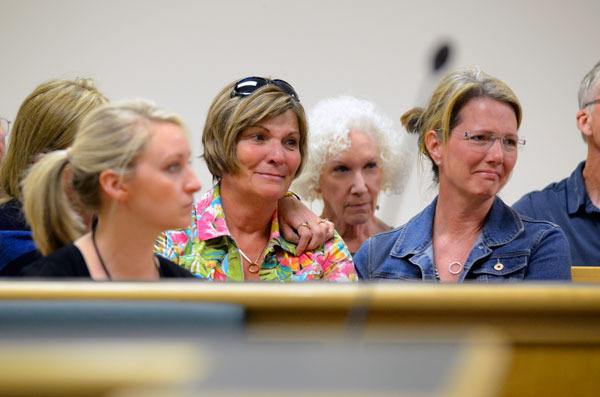State police did have probable cause to draw blood from Michelle Nichols without a warrant, and the results will be admissible in court, a judge ruled Thursday afternoon.
 Island County Superior Court Judge Vickie Churchill’s decision brought an end to the question of whether or not key evidence in the vehicular homicide case against Nichols could be used in a trial.
Island County Superior Court Judge Vickie Churchill’s decision brought an end to the question of whether or not key evidence in the vehicular homicide case against Nichols could be used in a trial.
The decision resulted in an audible sigh of relief from family and friends of Tim Keil, the 61-year-old Freeland man who died in the 2015 crash. A small crowd attended the hearing to hear the judge’s decision about the important piece of evidence.
“I am elated as much as other family and friends with today’s ruling,” said Mary Jo Keil, Tim Keil’s widow.
Though a trial is still pending, the uncertainty of the hearing and what it meant to the case was a heavy weight to bear and that she’s grateful for the judge’s ruling, she said.
Churchill’s decision concluded a two-day evidentiary hearing concerning a motion to suppress Nichols’ blood results by her Langley attorney, David Carman. Though they revealed a blood alcohol content of .11 — the state limit is .08 — the blood was withdrawn without a warrant while she was unconscious in a Seattle hospital.
The blood was taken under what’s called “exigent circumstances,” rare situations that permit exceptions to Fourth Amendment warrant and seizure requirements. In this case, it was done to stop the destruction of evidence, namely Nichols’ blood as it was taken after police confirmed she’d been given two bags of blood due to injuries she’d suffered in the collision. That was nearly four hours after the crash occurred.
The hearing saw the testimony of several troopers wit the Washington State Patrol involved in the investigation, examining what they knew and when.
Churchill ruled that that while police did lack a warrant, cell phone coverage problems and locational issues made acquiring one difficult, and that police ultimately knew enough to proceed.
“Looking at the totality of the circumstances — the remote location of the accident, the length of time it took to get information about the blood transfusions occurring at Harborview and the lack of good communications — the court finds that there were exigent circumstances for the warrantless blood draw of the defendant because with each minute that passed the blood alcohol evidence was being destroyed,” Churchill said. “The motion to suppress is denied.”
 Chief Criminal Prosecutor Eric Ohme said Thursday’s decision was an important moment in the case. The defense’s motion to suppress Nichols’ blood results wasn’t “frivolous,” and a ruling for the defense would have had a significant impact.
Chief Criminal Prosecutor Eric Ohme said Thursday’s decision was an important moment in the case. The defense’s motion to suppress Nichols’ blood results wasn’t “frivolous,” and a ruling for the defense would have had a significant impact.
“If we had lost this motion, we would have lost the major portion of our evidence,” Ohme said. “We’re in a much stronger position now to prove our case.”
“I think the judge made the right decision obviously,” he added.
Ohme said prosecutors would have pushed for a trial no matter what, but would have had to rely on other evidence in the collision. He expects a trial will wrap up by October, the end of the year at the latest.
If convicted, Nichols would face from 78 to 102 months in prison under the standard sentencing range.


